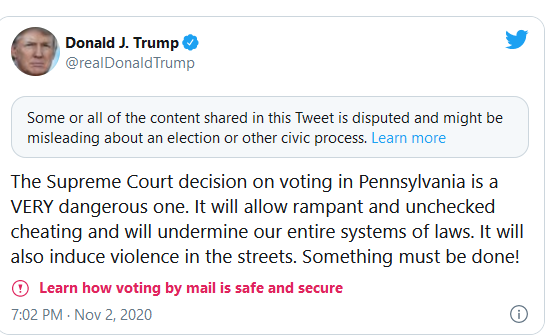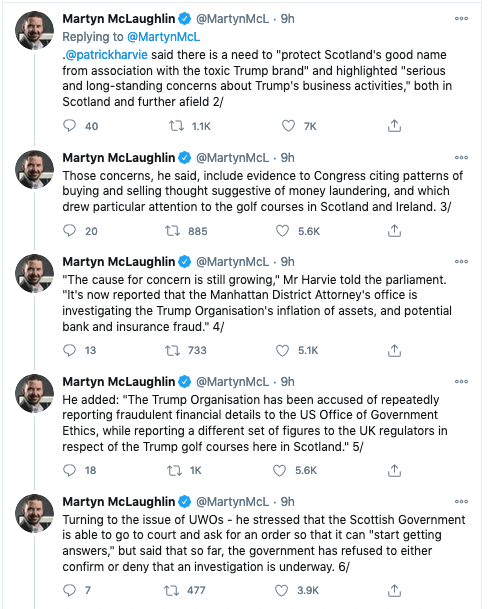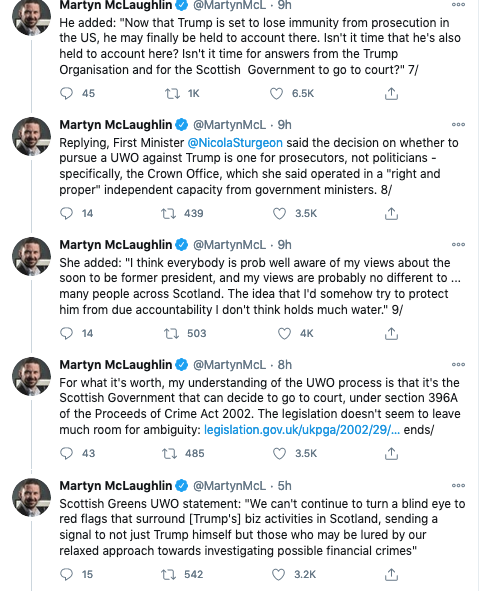Another installment from NYT - More on T’s taxes and what he owes
How Trump Maneuvered His Way Out of Trouble in Chicago - The New York Times
The financial crisis was in full swing when Donald J. Trump traveled to Chicago in late September 2008 to mark the near-completion of his 92-floor skyscraper.
The fortunes of big companies, small businesses and millions of Americans — including the Trumps — were in peril. But the family patriarch was jubilant as he stood on the terrace of his gleaming glass tower.
“We’re in love with the building,” Mr. Trump gushed. “We’re very, very happy with what’s happened with respect to this building and how fast we put it up.”
He and his family hoped the Trump International Hotel & Tower would cement their company’s reputation as one of the world’s marquee developers of luxury real estate.
Instead, the skyscraper became another disappointment in a portfolio filled with them. Construction lagged. Condos proved hard to sell. Retail space sat vacant.
Yet for Mr. Trump and his company, the Chicago experience also turned out to be something else: the latest example of his ability to strong-arm major financial institutions and exploit the tax code to cushion the blow of his repeated business failures.
The president’s federal income tax records, obtained by The New York Times, show for the first time that, since 2010, his lenders have forgiven about $287 million in debt that he failed to repay. The vast majority was related to the Chicago project.
How Mr. Trump found trouble in Chicago, and maneuvered his way out of it, is a case study in doing business the Trump way.
When the project encountered problems, he tried to walk away from his huge debts. For most individuals or businesses, that would have been a recipe for ruin. But tax-return data, other records and interviews show that rather than warring with a notoriously litigious and headline-seeking client, lenders cut Mr. Trump slack — exactly what he seemed to have been counting on.
Big banks and hedge funds gave him years of extra time to repay his debts. Even after Mr. Trump sued his largest lender, accusing it of preying on him, the bank agreed to lend him another $99 million — more than twice as much as was previously known — so that he could pay back what he still owed the bank on the defaulted Chicago loan, records show.
Ultimately, Mr. Trump’s lenders forgave much of what he owed.
Those forgiven debts are now part of a broader investigation of Mr. Trump’s business by the New York attorney general. They normally would have generated a big tax bill, since the Internal Revenue Service treats canceled debts as income. Yet as has often happened in his long career, Mr. Trump appears to have paid almost no federal income tax on that money, in part because of large losses in his other businesses, The Times’s analysis of his tax records found.
Alan Garten, the Trump Organization’s chief legal officer, said the company and Mr. Trump appropriately accounted for and paid all taxes due on the forgiven debts.
“These were all arm’s length transactions that were voluntarily entered into between sophisticated parties many years ago in the aftermath of the 2008 global financial crisis and the resulting collapse of the real estate markets,” Mr. Garten said.
On television back in those heady Chicago days, the future president was playing a wildly successful real estate developer, and the shimmering new skyscraper became part of that mystique.
It was the biggest thing Mr. Trump ever built. It was also the last.
The Money Behind the Project
Since at least the 1990s, Mr. Trump had dreamed of erecting a skyscraper in the Windy City. “I had hoped to build something fantastic in Chicago for some time,” Mr. Trump would later write in The Chicago Tribune.
He selected a riverside plot of land that was home to the squat, seven-floor Sun-Times building. In 2001, he unveiled plans for what would be the tallest high-rise built in the United States since the 110-story Sears Tower was completed in Chicago in 1973.
The Trump International Hotel & Tower would include 486 condominium units, 339 hotel rooms, restaurants, a bar, two parking garages, a health club, a spa, and tens of thousands of square feet in retail space and conference facilities.
The condos, some priced at more than $4 million, would have sweeping views of Chicago and Lake Michigan. Rooms in the hotel, occupying lower floors of the building, would be for sale, too. Mr. Trump’s company would make money from selling the units (and parking spaces) and operating the building.
To pay for the construction, Mr. Trump arranged for two of his L.L.C.s, 401 North Wabash Venture — named for the project’s address — and its parent company, 401 Mezz Venture, to borrow more than $700 million.
Mr. Trump went to his longtime lender, Deutsche Bank, for the bulk of the money. Since 1998, he had borrowed hundreds of millions of dollars from the German bank. It had been so eager to establish a foothold in the United States that it had overlooked his history of defaults.
This time, Mr. Trump assured Deutsche Bank officials, including Justin Kennedy, the son of the now-retired Supreme Court justice Anthony Kennedy, that the Chicago development was a guaranteed moneymaker. In a sign of the Trump family’s commitment to the project, Mr. Trump told his bankers that his daughter Ivanka would be in charge. (Mr. Trump also appointed the 2004 winner of “The Apprentice” as the development’s “president.”)
Deutsche Bank agreed to lend $640 million to 401 North Wabash Venture. Mr. Trump agreed to personally guarantee $40 million of the loan. If his L.L.C. were to default, Deutsche Bank could collect that money directly from Mr. Trump.
Mr. Trump also went to Fortress Investment Group, a hedge fund and private equity company, for $130 million. This was a so-called mezzanine loan, which meant that it would be repaid only after the Deutsche Bank debt had been satisfied. Because of the greater risk, the Fortress loan came with a double-digit interest rate. The agreement with Fortress also required Mr. Trump’s 401 Mezz Venture to pay a $49 million “exit fee” when it repaid the loan.
If Mr. Trump defaulted, his lenders could seize the building.
Deutsche Bank and Fortress both planned to chop up the loans and sell at least some of the pieces. Deutsche Bank sold them mostly to American, European and Asian banks, Fortress mostly to private equity and hedge funds, including Dune Capital Management, which had recently been co-founded by Steven Mnuchin, the future Treasury secretary.
The loans were due in May 2008. By then, the proceeds from selling condos, hotel units and parking spaces were projected to generate enough cash for Mr. Trump to repay what he owed.
Using a thick black pen, Mr. Trump signed the loan agreements on Feb. 4, 2005. A month later, construction began.
Lenders Come Calling
Work on the project went more slowly than planned, and the residential portion was still under construction as the loans came due.
With the financial crisis enveloping the world, finding buyers for multimillion-dollar apartments suddenly became much harder. In the spring of 2008, Mr. Trump asked Deutsche Bank to delay the loan’s due date. The bank gave him an extra six months.
In mid-September, the crisis crescendoed with the bankruptcy of Lehman Brothers. Financial markets went haywire. The economy was on the precipice of a depression.
About a week later, Mr. Trump showed up in Chicago for the ceremony to mark the skyscraper’s near-completion.
After addressing the small crowd, Mr. Trump and three of his adult children — Ivanka, Donald Jr. and Eric — placed their hands in wet cement rectangles to commemorate the day. “I don’t want to tell you what that feels like,” Mr. Trump cracked, before waving his cement-caked hands for the cameras.
At that point, at least 159 units in the building were still unsold, and many more were under contract but hadn’t closed, according to New York court records. That meant hundreds of millions of dollars that Mr. Trump and his family had counted on to repay Deutsche Bank and Fortress hadn’t yet materialized. And the loans were due in barely six weeks.
Mr. Trump sought another extension. This time, Deutsche Bank said no.
Mr. Trump’s company still owed Deutsche Bank about $334 million in principal and interest, and Fortress $130 million, not including interest and fees.
Mr. Trump went on the offensive. In a letter to Deutsche Bank on Nov. 4, he accused it of helping ignite the financial crisis. This was important, because Mr. Trump went on to claim that the crisis constituted a “force majeure” — an act of God, like a natural disaster — that entitled him to extra time to repay the loans.
A few days later, Mr. Trump and his companies sued Deutsche Bank and Fortress, along with the other banks and hedge funds that had purchased pieces of the loans.
The suit accused Deutsche Bank of engaging in “predatory lending practices” against Mr. Trump. He sought $3 billion in damages.
Deutsche Bank soon filed its own lawsuit, accusing its longtime client of being a habitual deadbeat and demanding immediate repayment of the now-defaulted loans.
Inside Deutsche Bank, angry executives and lawyers vowed to never again do business with Mr. Trump, according to senior executives.
With the litigation pending (the parties soon entered into a series of “standstill agreements” that paused hostilities), the Trump family kept trying to find buyers for the condos.
“As it nears completion, it’s time for you to take your place in the one-of-a-kind Trump lifestyle this building offers,” Ivanka Trump said in an April 2009 sales video. “And you can be living it, right here, very soon.”
Turning Unpaid Debt Into Canceled Debt
Why didn’t the lenders seize the building?
Going to court to take over the unfinished skyscraper promised to be a costly, yearslong process, especially given Mr. Trump’s reputation for using the legal system to drag out fights and grind down opponents. It seemed simpler to resolve the dispute.
On July 28, 2010, lawyers for Mr. Trump, Deutsche Bank and Fortress notified the court that they had reached a private settlement. The terms weren’t disclosed.
But Mr. Trump’s federal tax returns, as well as loan documents filed in Cook County, Ill., provide clues to what happened: Mr. Trump was let off the hook for about $270 million. It was the type of generous financial break that few American companies or individuals could ever expect to receive, especially without filing for bankruptcy protection.
Before Mr. Trump defaulted, Fortress had expected to receive more than $300 million from his company: the $130 million in principal and roughly $185 million in anticipated interest and fees.
But Fortress and its partners — including Mr. Mnuchin’s Dune Capital, as well as Cerberus Capital Management, whose co-chief executive, Stephen A. Feinberg, would become a major Trump fund-raiser and go on to lead a White House advisory panel — quickly realized they wouldn’t ever collect that full amount.
Ultimately, Fortress settled for $48 million, which Mr. Trump wired to the firm in March 2012, according to people familiar with the deal.
The forgiven debts showed up in Mr. Trump’s tax returns. For 2010, Mr. Trump’s 401 Mezz Venture reported about $181 million in canceled debts. Two years later, DJT Holdings, an umbrella company that the Chicago project had been folded into, reported that another $105 million of debt had been forgiven. Most of that appears to reflect the unpaid Fortress sum.
In many ways, it repeated a pattern that had played out more than a decade earlier at Mr. Trump’s Atlantic City casinos: a cycle of defaulting on debts and then persuading already-burned lenders to cut him a break.
The Last $99 Million
Mr. Trump’s companies got a pass on the money they owed on the Deutsche Bank loan, too.
The 2010 settlement gave Mr. Trump a couple of years to sell hotel units, condos and parking spaces to repay that loan, according to Steven R. Schlesinger, a lawyer who represented the Trump Organization in the Chicago litigation.
By 2012, the Trump Organization had drummed up about $235 million to repay the financial institutions to whom Deutsche Bank had sold pieces of the original loan. They included banks and asset managers in the United States, Germany, Ireland and China, according to court records.
But Mr. Trump still owed $99 million, according to people familiar with the debt. Where would he come up with that money?
Though Deutsche Bank had vowed to do no more business with Mr. Trump, his son-in-law, Jared Kushner, introduced him to his personal wealth manager at the bank, Rosemary Vrablic. Ms. Vrablic, with the support of her superiors, soon agreed to restart the relationship with Mr. Trump.
In 2012, Ms. Vrablic’s division made two loans secured by the Chicago skyscraper: one for nearly $54 million, another for $45 million, according to loan documents filed with the Cook County Recorder of Deeds. Mr. Trump agreed to personally guarantee the new loans, according to several people familiar with the deal.
The funds were used to immediately repay the $99 million that Mr. Trump still owed on the original Chicago loan, the people said. In other words, one wing of Deutsche Bank was providing Mr. Trump the money to repay another division of the same bank.
The following spring, the Trump Organization repaid $54 million, according to a person briefed on the matter and Cook County records. That left $45 million outstanding. But in 2014, Deutsche Bank agreed to lend another $24 million on the property and to extend the due date until 2024, records show. Mr. Trump now owed the bank $69 million. By May 2016, he had repaid the $24 million.
At that time, the Chicago loans were only one element of the relationship between Deutsche Bank and Mr. Trump. Ms. Vrablic’s team also lent Mr. Trump’s company $125 million for work on his Doral golf resort in Florida and up to $170 million to transform the Old Post Office building in Washington into a luxury hotel. Mr. Trump personally guaranteed those loans, too.
The guarantees were advantageous for him. Because they counted as investments in his business for tax purposes, the guarantees increased the amount of losses he could use to avoid income taxes in the future. Mr. Trump’s federal tax returns show that he has personally guaranteed the repayment of $421 million in debts.
Most of that is on loans from Deutsche Bank. At the end of 2018, Mr. Trump and his companies owed the bank $330 million.
Whittling Down Tax Bills
The I.R.S. requires taxpayers to treat forgiven debts as income when calculating what they owe in federal taxes. The New York attorney general, Letitia James, is investigating whether Mr. Trump followed the law.
The tax records reviewed by The Times show that while Mr. Trump accounted for $287 million of income from his canceled debts, he managed to avoid paying income taxes on nearly all of it.
Mr. Trump reported $40 million of forgiven debt as income in 2010. But losses from his businesses — including $30.8 million in red ink on the Chicago project — meant he had no taxable income that year.
Mr. Trump avoided immediate income taxes on another $104.8 million of the forgiven loans in a way that could increase his taxes later. He would generally have been entitled to write off the total amount he spent on a building over a number of years, a process known as depreciation. Instead, he agreed to reduce those eventual write-offs by $104.8 million, an alternative allowed in tax law.
For the other $141 million, Mr. Trump took advantage of a law, passed after the 2008 financial crisis, that allowed income from canceled debts to be deferred for five years and then spread out over the next five. Each year from 2014 through 2018, Mr. Trump declared $28.2 million of canceled-debt income.
As it turned out, though, losses in other parts of his business wiped out most of his federal tax bill on that income. He paid nothing for 2014; $641,931 for 2015; and, after credits, only $750 a year for 2016 and 2017. It isn’t clear how much he paid for 2018.
Loans Coming Due
Like Mr. Trump’s other properties, the Trump International Hotel & Tower in Chicago has benefited in some ways from its connection to the president.
Last year, for example, an aviation company that was lobbying the Trump administration for contracting work held an event there. Mr. Trump attended an October 2019 lunch fund-raiser at the hotel, which generated about $100,000 in revenue for his company, The Washington Post reported.
But the skyscraper’s fortunes have withered. Most of its retail space has never been occupied, The Real Deal reported last year. Its revenue declined from $67 million in 2014 to $50 million in 2018, while profits plunged from $16.3 million to $1.8 million over the same period.
The problems intensified in 2020, as the coronavirus forced restaurants, including Mr. Trump’s in Chicago, to close. The Trump family sought financial relief from Deutsche Bank among others.
The bank offered to let Mr. Trump’s companies pause interest payments on their loans. The Trump Organization decided the bank’s proposal was insufficiently generous and turned it down.
The loans come due in 2023 and 2024.





